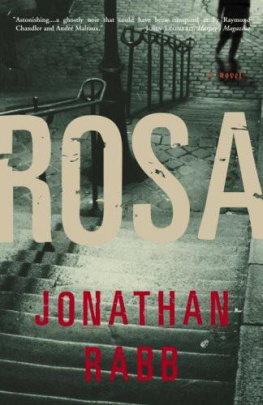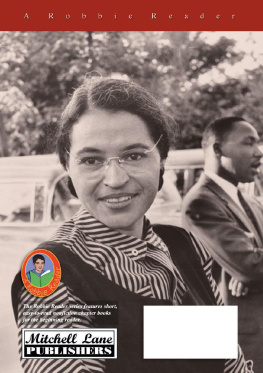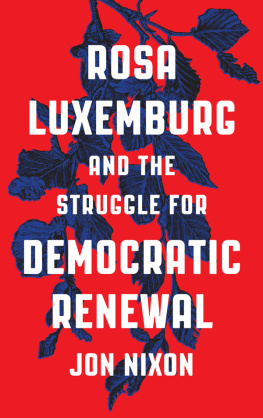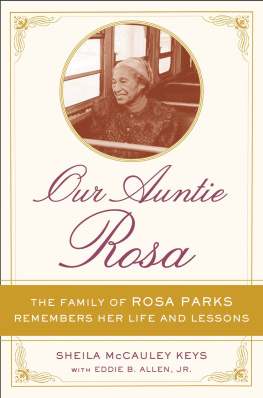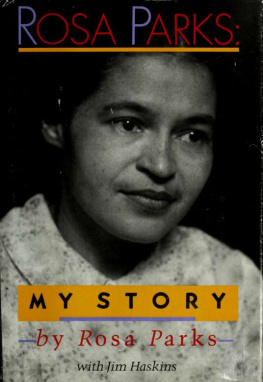Jonathan Rabb - Rosa
Here you can read online Jonathan Rabb - Rosa full text of the book (entire story) in english for free. Download pdf and epub, get meaning, cover and reviews about this ebook. year: 2007, publisher: Orion Publishing, genre: Detective and thriller. Description of the work, (preface) as well as reviews are available. Best literature library LitArk.com created for fans of good reading and offers a wide selection of genres:
Romance novel
Science fiction
Adventure
Detective
Science
History
Home and family
Prose
Art
Politics
Computer
Non-fiction
Religion
Business
Children
Humor
Choose a favorite category and find really read worthwhile books. Enjoy immersion in the world of imagination, feel the emotions of the characters or learn something new for yourself, make an fascinating discovery.
- Book:Rosa
- Author:
- Publisher:Orion Publishing
- Genre:
- Year:2007
- Rating:3 / 5
- Favourites:Add to favourites
- Your mark:
- 60
- 1
- 2
- 3
- 4
- 5
Rosa: summary, description and annotation
We offer to read an annotation, description, summary or preface (depends on what the author of the book "Rosa" wrote himself). If you haven't found the necessary information about the book — write in the comments, we will try to find it.
Jonathan Rabb: author's other books
Who wrote Rosa? Find out the surname, the name of the author of the book and a list of all author's works by series.
Rosa — read online for free the complete book (whole text) full work
Below is the text of the book, divided by pages. System saving the place of the last page read, allows you to conveniently read the book "Rosa" online for free, without having to search again every time where you left off. Put a bookmark, and you can go to the page where you finished reading at any time.
Font size:
Interval:
Bookmark:

Jonathan Rabb
Rosa
A NOVEL

Crown Publishers
Contents
FOR ANDRA
Acknowledgments
I am indebted to Professors David Clay Large and Peter Fritzsche for their help in bringing to life the Berlin of 1919. I also thank Peter Speigler and Sean Greenwood for their wise advice and encouragement on the earliest drafts of the bookmore so for their friendshipand Professor Abraham Ascher for his expertise on the German Revolution and its aftermath. For her wonderful renderings of the lace patterns, I am also grateful to Anne Auberjonois. And to Byron Hollinshead and Rob Cowley, who once again went beyond the call in championing this manuscript, I am indeed lucky to call them friends.
As always, Matt Bialer and Kristin Kiser kept me on the right course with good humor, insight, and enthusiasm. All writers should have such agents and editors.
And finally I would like to thank my family, and especially my wife, Andra, who possess an unending supply of support.


In the last days of the First World War, socialist revolution swept across Germany, sending Kaiser Wilhelm into exile, and transforming Berlin into a battleground. Order returned only when the two leaders of the movementKarl Liebknecht and Rosa Luxemburgwere hunted down and assassinated on the fifteenth of January, 1919. Liebknechts body was discovered the next morning; Luxemburgs body, however, remained missing until the end of May
Speculation about Rosas fate during those months continues to this day.
This is one possibility.
 PART ONE
PART ONE 


ONE
 1919
1919 
B erlin in December, to those who know her, is like no other place. The first snows take on a permanence, and the wide avenues from Charlottenburg to the Rondell breathe with a crispness of Prussian winter. It is a time when little boys drag their mothers away from the well-dressed windows at KaDeWe or Wertheims or the elegant teas at the Hotel Adlon and out to the Tiergarten and the wondrous row of marble emperors along the Siegesallee. Just as dusk settles, as the last flurries of the day swirl through the leafless trees, you can steal a glimpse of any number of little eyes peering up, hoping, just this once, to catch a stony wink from an Albrecht the Bear, or a Friedrich of Nuremberg with his large ears and dour expression. Just a wink through the snow to tell him that Christmas will be kind to him this year. There, Mama, did you see! Do you see how he winked at me! And the pride that next morning, bundled up beyond measure, racing out from his fine house on Belziger or Wartburg Strasse to tell his friends of his triumph. Yes, me, too! Me, too! Berlin in December.
This, however, was January, when the snow had turned to endless drizzle, so raw that it seemed to penetrate even the heaviest of layers. And whatever civility they might still be clinging to elsewhere, here on the east side of town, all the way up to the flophouses in Prenzlauer Berg, people had little time or patience for such gestures. Christmas had brought nothing, except perhaps the truth about how the war had been lost long before the summer, how the generals had been flimflamming them all the way up to the November capitulation. Oh, and of course, the revolution. Christmas had brought that, a thoroughly German revolution, with documents in triplicate, cries from the balconies, demonstrations and parades, tea still at four oclock, dinner at seven, and perhaps a little dancing afterward up at the White Mouse or Maxims. Shots had been fired, naturally, a few hundred were dead, but the socialistsnot the real socialists, mind youwere straightening everything up.
Still, it was the weather that had most people on edge. The rain just wasnt giving in, and it was why Nikolai Hoffner, rather than waiting out on the tundral expanse of the Rosenthaler Platz, had snuck off to Rckers bar for something warm to drink. Years of experience had told him that nothing of any significance was going to happen today: later on, he would come to regret that arrogance. So, with a knowing smile, he had left the ever-eager Hans Fichte up on the square; at the first sign of trouble, Fichte knew where to find him.
Hoffner sat with a brandy (Id walk a mile for Mampes brandy, it makes you feel so hale and dandy!), the early edition of the BZ am Mittag in front of him. He had not sat like this in weeks, a quiet read to clear the mind. And not because of the nonsense that had been going on out at the stables, or up at the Reichstag: all the pretty uniformed men had managed to disrupt traffic too many times, now, to recount. No, Hoffner had been up to his ears in real violence, genuine terror, hardly the kind plotted in Red pamphlets or designed in back rooms by overfed burghers calling themselves socialists. They played at revolution; he knew another kind. But for todayorders from on highhe was told to leave that alone and join the rest of his breed in the streets to make sure nothing untoward would come to pass.
Hoffner finished off the last of his drink and nodded to the barman to bring him another. As he was one of only three people in the placea man at a corner table, his head tilted back against the wall, his mouth gaped open in sleep; a woman with a beer and bread, her business at one of the nearby hotels temporarily interruptedthe service was unusually prompt. The barman approached with the bottle.
This, Im sad to say, will have to be the last.
Hoffner looked up from his paper. Im sad to hear. He had a steady, reassuring voice.
Its this damned rationing, said the man. This and another bottles all Ive got for the day. My apologies.
Hoffner half smiled. What do you care if the moneys coming from me or from someone else?
Simple economics, mein Herr. No brandy, fewer people in here to buy my sausages before they rot. The man opened the bottle. Its called the distribution of capital, or something like that. You understand.
Hoffners smile grew. Completely.
Andthe man nodded as he pouredthe moneys not coming from you. It never does. So why dont you be nice to me today and let someone else pay for the brandy?
Hoffner reached into his coat pocket and produced a ten-pfennig coin. He placed it on the table.
The man smiled again as he shook his head. No, no. I like that you dont pay. You like that you dont pay. We may be governed by socialists now, but its better that you hold on to your money.
The man popped the cork back into the bottle and headed for the bar. Time to wake up, Herr Professor Doktor, he said as he moved past the man in the corner. The man at once opened his eyes, looked around in a daze, and then, in one fluid movement, pawed out his beard, picked up his umbrella, and stood. Upright, he seemed far more impressive, though from the look of his clothes, one had to wonder how much sleep he had gotten in the last few days. He peered over at Hoffner. Is it safe out there, mein Herr ?
Next pageFont size:
Interval:
Bookmark:
Similar books «Rosa»
Look at similar books to Rosa. We have selected literature similar in name and meaning in the hope of providing readers with more options to find new, interesting, not yet read works.
Discussion, reviews of the book Rosa and just readers' own opinions. Leave your comments, write what you think about the work, its meaning or the main characters. Specify what exactly you liked and what you didn't like, and why you think so.

